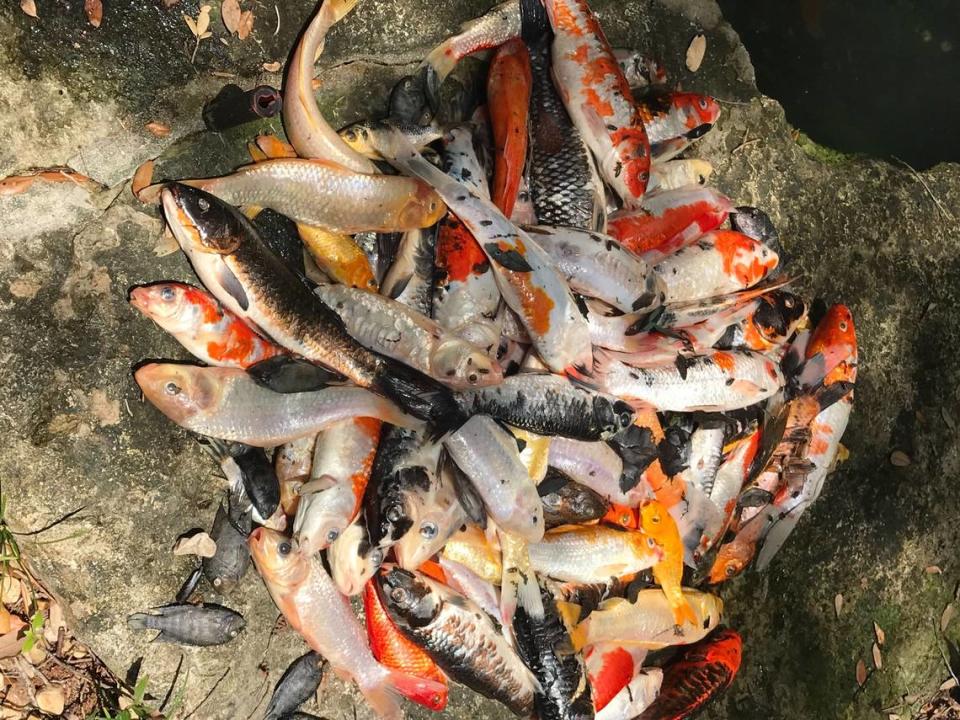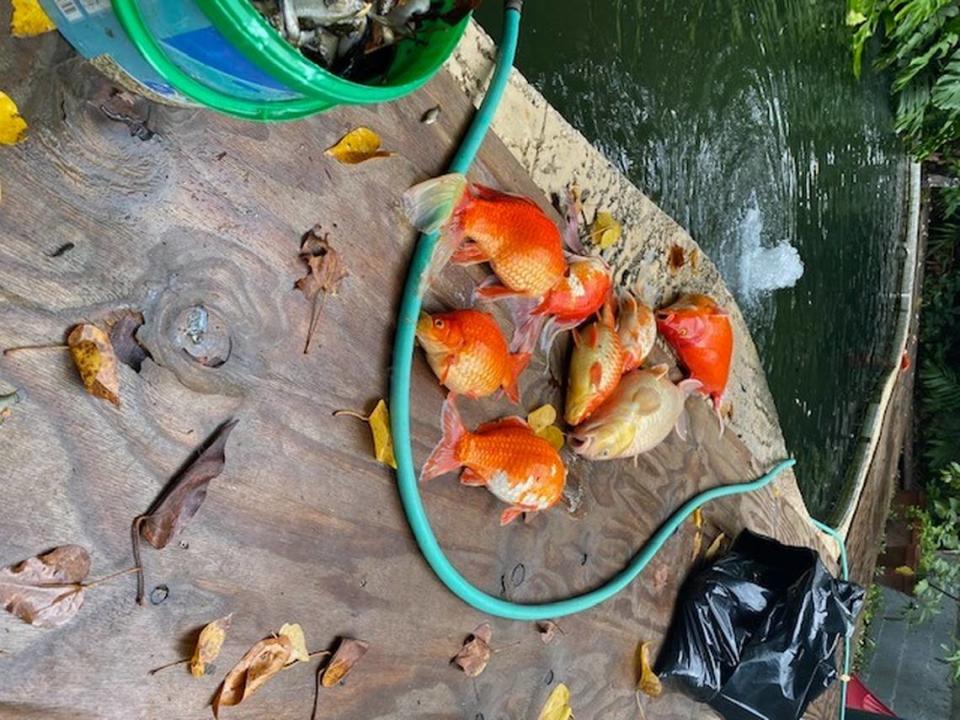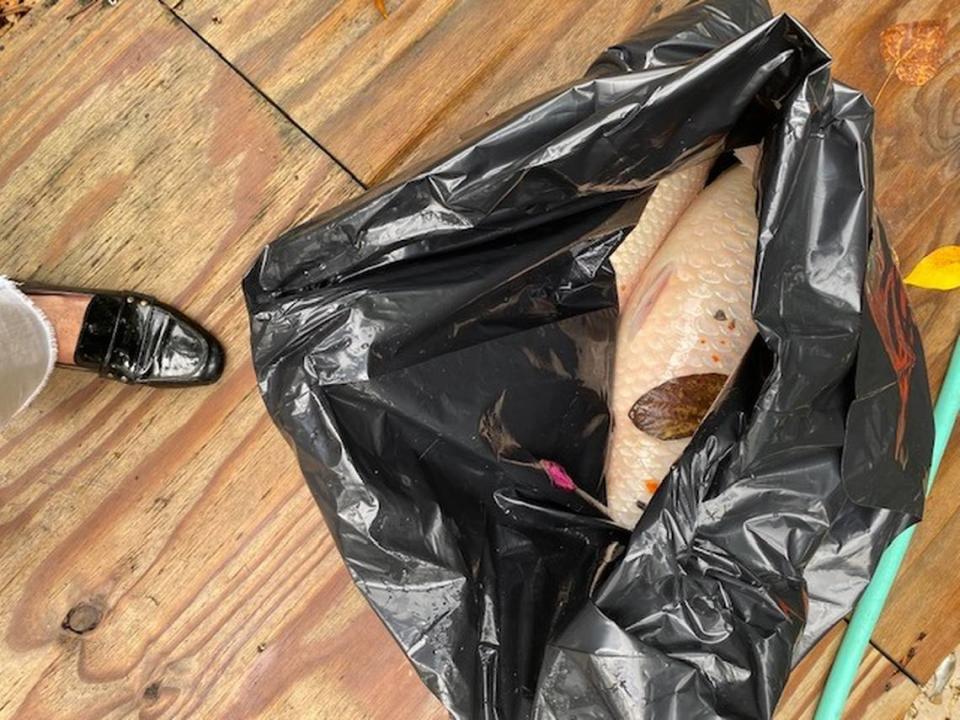‘They were my babies.’ Koi fish are mysteriously dying in a Coconut Grove neighborhood.
Florence Danly named the koi that swam in her backyard pond. There was Sky and Bella and Big Mama and Goldie and — her favorite — Marilyn, a large-eyed diva of a fish who liked to flaunt her beautiful pale yellow scales with flashy undulations of her luxuriant tail fin.
One night, under Miami’s recent full Pink Moon, Danly sat by the pond feeling a sense of peaceful wonderment as she watched her 20 koi and hundreds of smaller fish gamboling in the glow.
The next morning, they were dead. Belly up, floating motionless on the surface. Nearly 200 pounds of fish, scooped into black trash bags.
“A vision of horror,” Danly said. “My entire body was trembling. I am very attached to my fish. One day they are fat, gorgeous and healthy and all of a sudden they are gone.”

On Saturday, eight days after the die-off at Danly’s house in North Coconut Grove, her neighbors awoke to a similar ghastly sight. Lee Marks and Daliana Mantegazza, koi collectors for 30 years, lost about 150 of the fish prized for the exotic coloring that makes it look like they’ve been painted. The sobbing couple and their sons frantically tried to save them by jumping into the pond and transferring fish into bins filled with fresh water. Only a dozen survived.
“They were my babies,” Mantegazza said. “They’re my therapy. I don’t smoke or drink or shop, but every morning I have coffee with my fish. We used to swim in the pond with them.”
The cause of death is a mystery. The Florida Fish and Wildlife Conservation Commission and Miami-Dade’s Department of Environmental Resources are investigating what happened at Danly’s and Marks’ ponds, two others in Coconut Grove and Miami Beach and at Simpson Park by testing water samples and performing necropsies on fish corpses. Pond maintenance issues may have been a factor. And the hot, dry weather in the past few weeks may also have affected oxygen levels in the ponds.
Concerns of contaminants in ground water
Devastated fish owners, whose losses were first reported by Local 10, think there must be something in the ground water that fed their ponds, perhaps deadly chemicals or pollutants that leached into wells. Their pumps were functioning and they’ve ruled out contamination from aerial or truck spraying of insecticides because Miami-Dade County confirmed no spraying occurred in those areas. One theory was that the fish were poisoned by Bufo toads but there are no signs of the toxic toads, tadpoles or eggs in the ponds. Danly checked with her food supplier and found no problems.
“It’s a puzzle, and it’s driving me absolutely nuts that we haven’t solved it because I’m worried more fish could die,” said Jen Wheeler, who has tended to several outdoor aquariums in South Florida with her Pond Doctor business. “These were well-maintained ponds with normal levels of oxygen, pH, nitrites and nitrates, and full of healthy fish of good size, no parasites.”
Wheeler, a marine biologist, did on-site water analysis and necropsies.
“I found browning of the gills and blackening of the liver and spleen, which is indicative of a toxin,” she said. “We don’t know yet but maybe construction nearby could have broken free something contaminated by arsenic or sulphur or botulism.”

But at least one location in Coconut Grove had extremely low dissolved oxygen levels in the water, according to e-mail messages between the Pond Doctors and FWC.
FWC said it would analyze six fish that were being shipped to one of its labs on Wednesday. Depending on the tests, the results of more complex tissue analysis could take up to two weeks, said spokeswoman Susan Neel.
Collecting water samples
Miami-Dade’s Department of Environmental Resources has collected water samples from Simpson Park, at 5 SW 17th Road between Brickell and The Roads, where dozens of koi in a pond also died last month.
“We will be sampling for a wide variety of parameters to try to identify any possible connections between the well water and the death of the fish,” spokeswoman Tere Florin said in emailed response to the Herald. DERM will test for metals, pesticides, ammonia, nitrates and nitrites and dissolved oxygen, among other possible contaminants.
Road work on Tigertail Avenue adjacent to the homes of Danly and Marks could be the culprit, Marks said.
“They were digging deep — it wasn’t just a patch job,” he said. “Maybe proper precautions were not taken and something dangerous leaked into the ground water and flowed into our ponds.” Nothing yet has affected a neighbor three doors down who has a pond, he added.
“A mass fish kill like this — I’ve never seen anything like it.”
Miami-Dade Water and Sewer Department said there was no work done on pipes in that area recently, spokeswoman Jennifer Messemer-Skold said. She also said that drinking water in Miami-Dade is safe because it’s purified before it gets to people’s homes.
“The ponds use ground water from wells. The water that people drink and use in their homes is treated water; these are two completely different things,” she said.
Wheeler said three of her clients’ ponds were hit hard in 2017 as a result of mosquito spraying that released too heavy a concentration of insecticide.
“We made the diagnosis right away, notified the county right away. They fixed it immediately and it hasn’t happened since,” Wheeler said. The county’s Mosquito Control team hasn’t started spraying in that area this year, spokesman Michael Mut said.
Hot days, lack of rain
One possibility is that the potentially lethal combination of very hot days and nights and a lack of rain in recent weeks may have lowered oxygen levels in the ponds. Because South Florida experiences many days of extreme heat, koi ponds need “copious amounts” of oxygen for the fish to stay healthy, said Paul Radice, an ornamental fish breeder and owner of Angels Hatchery in Homestead.
“Koi are very tough fish, but it doesn’t take much for water temperatures to rise in South Florida and that can affect oxygen levels very quickly. So oxygenating the water, making sure you have more oxygen than you ever thought you would need, is very important here,” he said.
Residents also said they saw other strange deaths in the neighborhood, but they are likely unrelated to the fish kill, according to DERM.
Marks saw a raccoon go into convulsions and die in his driveway. There have been reports of dead birds, possums and owls, sick dogs and butterflies that disappeared from gardens. There’s lots of house construction on nearby Seminole Street in the Grove.
Danly said her aviary is fine but she’s nervous about her African gray parrot and 35 cockatiels, parakeets and canaries.
“I am missing and mourning my fish,” said Danly, who created the pond out of their backyard swimming pool 20 years ago when her young son became fascinated with marine life and loved snorkeling among the fish. At her old house in France, she built a sanctuary for hundreds of ducks and geese. “Animals have compassion. I watched my beautiful koi take care of Big Mama in her old age.”
Radice, who’s been working with koi since 1972, said his clients often describe feeling relaxed and happy when they watch the vividly colored fish swimming in their ponds.
“I had a couple here recently and they said, ‘You know, when people come over, they could be very upset but they sit down at our koi pond for a few minutes and all that stuff just melts away,’” he said.
Koi ponds have grown increasingly popular in South Florida, where the climate is conducive to raising the subspecies of Amur carp that originated in Asia and was bred in Japan into 100 varieties of ornamental koi.
Koi collectors can spend between $300 and $5,000 per fish. One sold for $1.8 million at an auction in Japan in 2018.
“It’s tranquil and therapeutic,” Wheeler said. “It’s like looking at swimming masterpieces of art.
“It’s not just a rich man’s hobby. Anybody can build a pond. Koi are like pets. They do need care and attention but in the right ecosystem they are quite hardy.”


